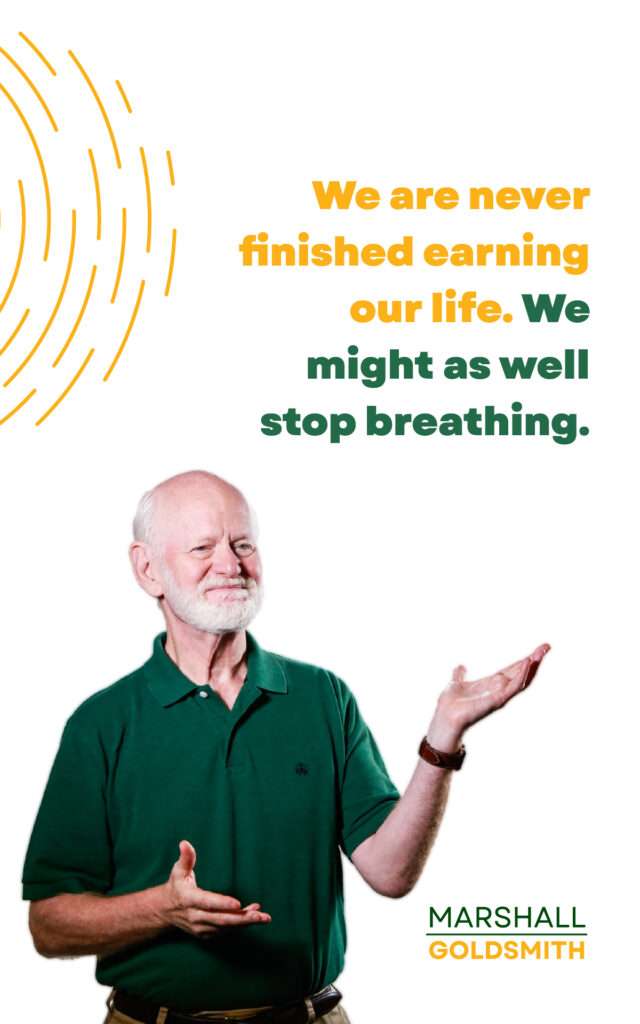Playing Favorites By Marshall Goldsmith There’s a reason I devote...
I have spoken about Buddhism and my approach to coaching, which uses one of the Buddha’s main tenets regarding living well: Everything is impermanent, and we are constantly renewing ourselves with every breath, changing constantly. This is a very different perspective than most of Western thinking, which looks toward the future or the past, and rarely the present. I wrote about how I came up with the concept of the Every Breath Paradigm, based on my understanding of Buddhist teachings, to help clients move forward.
You might be wondering why I’m going on about spiritual matters. The reason is that the Every Breath Paradigm can have immediate effects on your well-being, and your sense of fulfillment.
If we accept that everything of value that we have earned is impermanent and it’s subject to the whims and indifference of the world — from the small stuff like a teacher’s praise to the big stuff like our good reputation or the reciprocated love of the people we love — then we must also accept that these prized “possessions” need to be constantly re-earned, practically on a daily or hourly basis, perhaps as frequently as with every breath.
One of my most valuable contributions to my clients has been reminding them to stop torturing themselves about their past failures (“That was a previous you. Time to let it go.”). It very often clarifies for them that they are no longer at fault — sometimes they need the permission of a third party to give them leave to accept this.

I think it’s equally valuable when the opposite occurs: when my clients have felt the need to replay their career highlights reel for me. I see this most vividly in former athletes and CEOs who are struggling to create their next life. When they talk nostalgically about previous triumphs, whether it’s winning a gold medal fifteen years ago or leading an organization of twenty thousand people six months earlier, it’s my duty to yank them back to the present. I remind them that they are no longer that admired athlete or commanding CEO anymore. That was someone else.
This is no different from preferring to live vicariously through someone famous whom you follow religiously on social media. That famous person doesn’t know or care that you exist. You are strangers to each other. It’s the same with your constant returning to the glories of a previous you. It’s not that the honors and attention and respect, each well-earned in its time, were never real. But they have faded. To recall them is no longer an expression of fulfillment; it’s actually a regret about their impermanence, about how swiftly and unceremoniously they slipped away.
Recapturing that sense of fulfillment cannot be accomplished by wallowing in memories of who we were and what we accomplished. It can be earned only by the person we are in the present moment. It can only be earned again, and again, in subsequent moments when we become someone new.
“You’re only a success in the moment of the successful act. Then you have to do it again,” said basketball coach Phil Jackson, a student of Buddhism, after winning two consecutive NBA championships in the mid-1990s with the Chicago Bulls and then going for a third ring in 1998.
The truth is, we are never finished earning our life. There is no hard-stop moment when we can tell ourselves, “I’ve earned enough. I’m done.” We might as well stop breathing.

Adding Too Much Value Won’t Get You There By Marshall...
C-Suite Master Class: No, But, However By Marshall Goldsmith Continuing...
The Doerr Institute: Expanding the Market for Coaches By Marshall...
Making Leadership Development Part of the College Degree at Rice...
Sanyin Siang – Winner of the Thinkers50 Marshall Goldsmith Coaching...
Thinkers50 Marshall Goldsmith Distinguished Achievement Award in Coaching – Nominees...
Leading with Influence: What Is Influence360°? By Marshall Goldsmith Founder...
Are You a Dominator, Manipulator, Persuader or Influencer? By Marshall...
Leading with Influence: Redefining Modern Influence Part 2 By Marshall...

My mission is simple. I want to help successful people achieve positive, lasting change and behavior; for themselves, their people, and their teams. I want to help you make your life a little better. With four decades of experience helping top CEOs and executives overcome limiting beliefs and behaviors to achieve greater success, I don’t do this for fame and accolades. I do this because I love helping people!
As an executive educator and coach, I help people understand how our beliefs and the environments we operate in can trigger negative behaviors. Through simple and practical advice, I help people achieve and sustain positive behavioral change.